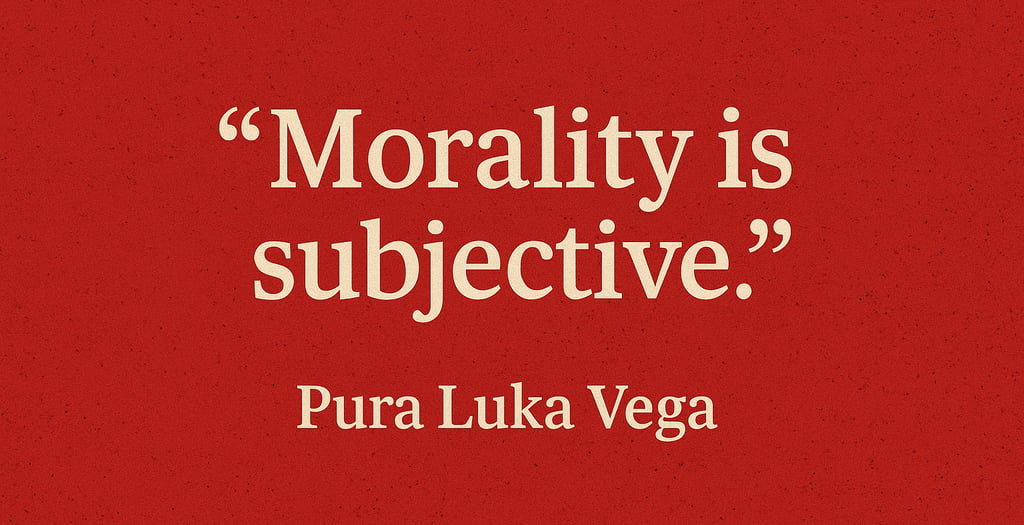Is Morality Really Subjective? A Reflection on Pura Luka Vega’s Statement
After hearing Pura Luka Vega say, “Morality is subjective,” I found myself sitting with that thought longer than expected. I didn’t watch the full interview—but that one line opened up a trail of questions about right and wrong, justice, art, and the danger of treating everything as just a matter of perspective. This piece isn’t a takedown. It’s not a hot take. It’s just me thinking it through—fairly, honestly, and maybe a little uncomfortably.


I’ve been thinking about something heavy lately—and it started with a single line from Pura Luka Vega:
“Morality is subjective.”
I didn’t watch the whole interview. I don’t know the full context. But that one phrase stuck with me. It lingered.
So I did some light reading. Nothing too deep, just enough to scratch the surface and figure out why that statement bothered me more than I expected.
And before anything else, let me say this:
This blog isn’t for everyone.
I’m not here to preach. I’m not trying to change anyone’s mind.
This is me, exercising mine.
Just thoughts over coffee, the kind that linger long after the cup’s gone cold.
Morality as a Matter of Opinion?
Vega’s claim taps into an old debate that never really goes away: is there such a thing as right and wrong that applies to all people, or is it all a matter of culture, upbringing, or personal taste?
Philosophers call it moral relativism—the idea that moral truths aren’t universal. What’s right in one place may be wrong in another. What’s good for you might not be good for me.
It sounds like tolerance. But when you think it through, it starts to fall apart.
When Tolerance Cancels Itself Out
If all morality is relative, then no one has the right to say anything is wrong. Not slavery. Not genocide. Not rape. Not corruption.
And that’s where relativism breaks down.
You can’t say, “We should respect everyone’s morals,” because that’s already a moral statement. It assumes respect is a universal good—which means you’ve just contradicted yourself. That’s what philosophers call self-refuting: denying the very thing you’re trying to claim.
It’s like trying to outlaw laws.
And let’s be real—no one actually lives like a moral relativist. Even people who say morality is subjective still call out injustice when they see it. We all draw lines somewhere. And when we do, we’re assuming that those lines aren’t just personal. We believe they matter—even if someone disagrees.
The Illusion of Progress
Another problem with moral relativism? It erases the idea of moral progress.
If morality is just about what society agrees on, then we can’t say that outlawing slavery, fighting for women’s rights, or standing up for gay marriage was better than what came before.
All we can say is: “It changed.”
And that’s not good enough. Some things should be seen as wrong, even if they were once legal or accepted. And some things should be called good, even if they still make people uncomfortable.
Progress assumes there’s something to progress toward. Relativism leaves you circling the drain.
Real Life Doesn’t Work That Way
If morality really is subjective, then we should stop pretending to be outraged when we vote murderers into power.
If right and wrong are just a matter of opinion, then who are we to question politicians with a trail of stolen public funds, drug war victims, or padded budgets that never reached the barangays?
But we do question them. We post, we rage, we mourn. Because deep down, we know—some things are just wrong. You don’t need a theology degree to recognize injustice. You just need to be paying attention.
So when someone says “morality is subjective,” it starts to sound like a smokescreen. A defense mechanism. A way to silence criticism by pretending there’s no standard to begin with.
But if there’s no standard, then what do we say to the families of the innocent who were killed without due process? What do we say to students who can’t go to school because their mayor siphoned off the education budget? What do we say to the nurses forced to go abroad because the government doesn’t care enough to give them decent pay?
If morality is really just personal, then there’s no point in justice. No point in change. No point in asking for better.
And yet—we do.
Because whether we admit it or not, we believe that corruption is wrong, that abuse of power is wrong, and that human life has value, no matter what uniform you're wearing or what office you hold.
That belief doesn't come from opinion. It comes from something deeper. Something we can't shake, even when it's inconvenient.
So What About Pura Luka Vega?
Again—this isn’t a deep dive into Vega’s performance, intentions, or body of work. I didn’t watch the full interview. All I heard was one line: “morality is subjective.” And that line made me pause.
Still, there’s a problem with that statement. If you say morality is just opinion, you also give your critics the same out. If there’s no universal right or wrong, then people calling Vega “blasphemous” are just expressing their opinion too. You can’t ask for tolerance while denying the moral ground that makes tolerance meaningful.
Even Vega’s appeal to freedom and dignity suggests there is a deeper moral truth—that people deserve respect, that art should have space, that faith isn’t owned by institutions.
But if morality is just subjective, none of that holds up.
So yes, the logic of moral relativism has holes. But if we stop there, we miss something.
When Resistance Looks Like Blasphemy: What Vega’s Critics Might Be Missing
Let’s not pretend Vega wasn’t trying to provoke. Dressing as Jesus and singing Ama Namin in drag? In a country where religion is sewn into everything—from our politics to our family dinners—that was bound to stir the hornet’s nest.
But this isn’t just a story about shock value.
Because not all offense is born from disrespect. Sometimes, offense is a reaction to being shut out for too long—to being told that your version of faith, your existence, your voice, doesn’t belong.
There’s actually a strong moral and theological tradition that backs this kind of resistance. It’s called liberation theology, and it flips the usual church hierarchy on its head. It says God isn’t locked inside institutions—He’s found among the poor, the excluded, the queer. That theology doesn’t begin in the pulpit, but in the dirt and struggle of the oppressed. In that framework, salvation isn’t about following religious performance—it’s about breaking chains.
It’s not blasphemy. It’s prophecy.
Think of Amos or Isaiah—Old Testament prophets who called out injustice from the margins. They weren’t always polite. They didn’t wait for permission. They pointed fingers at power and paid the price. In a way, Vega stood in that same tension: confronting sacred symbols to challenge sacred systems.
Then there’s standpoint theory—a fancy term that basically says: those who’ve been pushed to the edges often see the cracks that insiders ignore. When you live outside the dominant script, you notice the lines that need rewriting.
Vega, as a queer artist in a deeply Catholic, conservative society, isn’t just throwing glitter for the sake of it. That performance, as jarring as it was, might’ve been a kind of truth-telling—an uncomfortable mirror showing us what exclusion really looks like.
Paulo Freire would’ve called that conscientização—critical consciousness. He believed the oppressed have a unique responsibility to shake things up. Not just to survive, but to transform. And sometimes, transformation requires disruption.
Even Pope Francis—yes, that Pope—has spoken about artists having a “prophetic role” in society. A role that challenges comfort zones, questions power, and calls people to look again at what they’ve always assumed.
Of course, that doesn’t mean Vega was automatically right. Or that everyone should agree with their method. Artistic expression isn’t immune to critique. But if we dismiss the message outright just because it made us uncomfortable, we might miss something important.
Maybe the real argument here isn’t whether morality is subjective or objective.
Maybe it’s about who gets to speak, and who gets heard.
Because in a country where some voices still have to scream just to be acknowledged, it’s worth asking: was Vega being offensive… or just finally being seen?
Arguing the Idea, Not the Person
Before anyone jumps to the wrong conclusion: this isn’t about trying to shut Pura Luka Vega down. I didn’t watch the full interview. I’m not dissecting their life, their beliefs, or their art as a whole.
This is just me responding to one phrase—“morality is subjective.”
And no, I’m not building a strawman. I’m not distorting their view just to knock it down. I’m arguing with the idea itself, because the idea has consequences—especially when it gets repeated often enough that we stop questioning it.
Some may call this overthinking. That’s fine. I don’t write for virality. I write to make sense of the noise.
So no, I don’t think morality is just a matter of taste. And I don’t think we get to redefine right and wrong every time it’s convenient.
But I also don’t think truth only lives in the mouths of bishops and politicians.
Sometimes it shows up in the loudest, messiest places—in drag, in protest, in art that forces us to look twice. Sometimes it wears glitter and breaks rules not to offend—but to remind us that the system was already excluding someone long before the performance began.
And if we’re serious about finding moral truth, we can’t just shout it from above.
We have to listen to the ones below.
Contact us
subscribe to morning coffee thoughts today!
inquiry@morningcoffeethoughts.org
© 2024. All rights reserved.
If Morning Coffee Thoughts adds value to your day, you can support it with a monthly subscription.
You can also send your donation via Gcash: 0969 314 4839.
